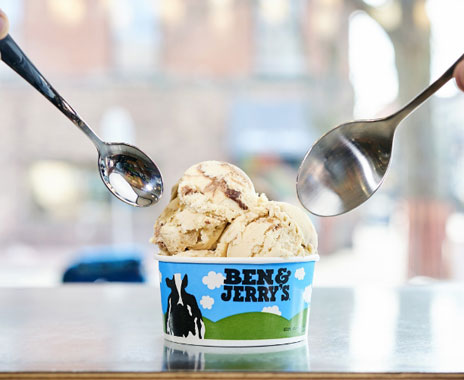Climate change is really taking its toll on the planet. Average global temperatures have risen sharply in the past few decades. Warming oceans are melting away the polar ice caps at unprecedented rates. And natural disasters are becoming more frequent and intense.
For many, those impacts may seem a world away from daily life, but the truth is that climate change is creeping closer and closer to home. And it’s headed straight for the freezer.
Pretty soon you could be seeing shortages of your favorite foods, including Ben & Jerry’s. The company relies on farmers all over the world for ingredients, and when they don’t have the predictable weather patterns needed for farming, that can mean no cocoa, no peanuts, and no Peanut Butter Cup ice cream.
These are the pints they’ve put on the “Endangered Pints List” because, like it or not, the effects of climate change are closer than you think.
Cocoa, aka Chocolate
Scientists predict that cocoa production could drop by as much as 50 percent by 2050. Cocoa needs a very specific environment to thrive: humid air, warm but not hot temperatures, and plenty of rainfall. And in western Africa, where over 70 percent of the world’s cocoa is grown, they have lots of land that fits the bill—for now. But as temperatures rise and rainfall stagnates, prime cocoa-growing areas will shift to higher altitudes. There’s just one problem—western Africa is pretty flat. So there’s nowhere to go when the land becomes too hot and dry for growing our favorite little brown beans.
That means that these pints are in real danger:
- Boom Chocolatta!
- Cherry Garcia
- Chocolate Chip Cookie Dough
- Chocolate Fudge Brownie
- Chocolate Peppermint Crunch
- Chocolate Therapy
- Everything But The…
- Half Baked
- Karamel Sutra Core
- Milk & Cookies
- New York Super Fudge Chunk
- Phish Food
- S’mores
- The Tonight Dough
- Vanilla Caramel Fudge
Nuts
Like chocolate, nut trees are very particular about the climate that they thrive in. Most importantly, they need the chill of winter to stimulate their spring growth. So as winter temperatures slowly creep up and up, more and more almonds, pecans, walnuts, and pistachios aren’t getting the winter chill-out time they need. Studies predict that throughout the next century, the earth will become less and less hospitable to nut trees, with those that need the most winter chill time left the most vulnerable.
Peanuts are notoriously fussy, needing several months of consistent warmth and just the right amount of rain. So it’s not good news that the regions that produce much of the world’s peanut supply (China, India, and the southern U.S.) are predicted to see more drought in the future, especially if current greenhouse gas emissions levels remain.
Worried about your favorite nutty flavors? Like these:
- Peanut Butter Fudge Core
- Peanut Buttah Cookie Core
- Banana Split
- Chubby Hubby
- Chunky Monkey
- Peanut Butter Cup
- Pistachio Pistachio
- Banana Peanut Butter Greek Frozen Yogurt
Coffee
Different varieties of coffee have specifically adapted to different climates around the world. That’s what makes them all so unique (and why your coffee snob friends might be so fond of the Sumatra Mandheling but not so keen on the Ethiopian Yirgacheffe on the coffee shop menu). It’s also why even small changes in climate can have a big impact on production. Warmer temperatures, long droughts, extreme rainfall, more resilient pests, and rapidly spreading diseases are all taking their toll on coffee production. And—you guessed it—all those things are associated with climate change.
At this rate, one study predicts that the number of pre-existing regions suitable for growing coffee could shrink anywhere from 65 to 100 percent by 2080. That means a whole lot less of your favorite coffee flavors:
- Coffee Caramel Fudge Non-Dairy
- Coffee Toffee Bar Crunch
- Coffee, Coffee BuzzBuzzBuzz!
As the effects of climate change creep closer and closer to our daily lives, it’s becoming more and more important that people do everything they can to reduce global emissions and move toward a sustainable future.










